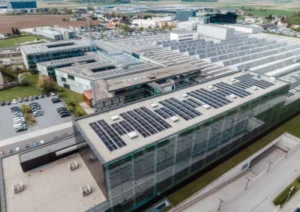Engel commits to internationally recognized SBTi standards
Vienna, Austria – By committing to the internationally recognized SBTi standard, ENGEL is setting science-based targets for reducing its greenhouse gas emissions. The injection molding machine manufacturer is accelerating its activities for climate protection by doing so, while making its commitment even more transparent at the same time.
“We are working consistently to increasingly improve the sustainability of our processes along the entire value chain”, says Dr. Stefan Engleder, CEO of the ENGEL Group of Companies. “We want people around the world to be able to rely on the fact that they are using plastic products in their everyday lives that were manufactured in a way that conserves resources.”
One contributing factor is, for example, the fact that ENGEL uses one hundred percent green electricity in all of its Austrian plants, a continually increasing proportion of which is generated by its own photovoltaic systems. The fact that proprietary technologies by ENGEL are used to process recycled plastic waste to create high-quality new products is a further building block.
With its commitment, ENGEL sets the standard for sustainability in the industry, and this has also been objectively and independently verified. Last year, ENGEL improved its sustainability ranking from silver to gold and is the only injection moulding machine manufacturer with gold status today.
“Our commitment to SBTi is our way of taking the next logical step,” as Engleder points out. “We are offering our customers the best possible transparency and benchmarking in terms of our climate protection activities by ensuring independent verification in line with internationally recognized standards.”
ENGEL is one of the first companies in injection moulding machine manufacturing to set science-based reduction targets to achieve Net Zero and subject them to a review under the Science Based Targets Initiative (SBTi). The decisive factor for SBTi approval is that the defined targets help meet the Paris Climate Agreement.
In concrete terms, ENGEL is reducing all Scope 1 and Scope 2 emissions by 50 percent and Scope 3 emissions by 42 percent by 2030 compared with 2022. “In our opinion, the greatest leverage for reducing greenhouse gases, beyond material- and energy-efficient solutions and the expansion of renewable energy sources, can primarily be achieved by digitalizing production processes and establishing a circular economy,” says Stefan Engleder. “For this fiscal year, we have budgeted €10 million for the expansion of our own renewable energy production alone. Beyond this, we are increasingly focusing our development activities on efficient and recyclable solutions”.
ENGEL already reached another important milestone in the spring of this year. The St. Valentin plant in Austria was recognized as a ClimatePartner certified production plant. Following a successful audit, production plants receive this seal of quality only if they calculate their emissions in detail, define ambitious CO2 reduction targets, implement effective reduction measures, support high-quality climate protection projects, and communicate in a transparent way. The ENGEL large machine plant already meets all of these requirements. This makes ENGEL one of the first companies worldwide to achieve ClimatePartner certification.
One of the factors contributing to successful certification was the conversion of heat generation to biomass. “As early as next winter, this will help us achieve a significantly lower carbon footprint, and this will already take us very close to Net Zero in direct emissions for the St. Valentin location,” says Engleder.
SBTi is an initiative of leading NGOs and business associations, including CDP (Carbon Disclosure Project), UNGC (United Nations Global Compact), WRI (World Resources Institute) and WWF (World Wildlife Fund), to develop methods and criteria for effective climate protection in the enterprise and validate the targets set by companies.

